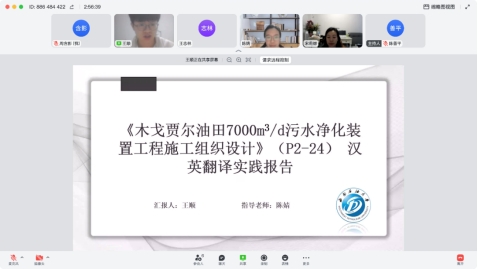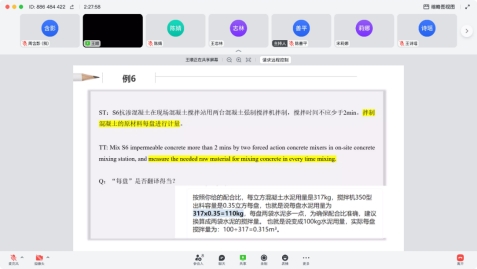
内容简介:
本翻译实践报告中的翻译材料节选自《木戈贾尔油田7000m3/d污水净化装置工程施工组织设计》。此翻译材料由中国联合石油有限责任公司于2021年5月20日发布,由成都思译翻译有限责任公司提供。
《木戈贾尔油田7000m3/d污水净化装置工程施工组织设计》全书共10章内容,作为污水净化装置工程前期的设计蓝图文件,此书详细地介绍了此次工程的前期准备工作;中期操作流程;以及后期的结果验收,内容涉及土建施工、管道安装、设备制安及相应的电气、仪表、通讯及结构安装等配套公用工程施工。而译者在此次翻译实践中所分配到的部分是关于污水净化装置工程前期的工艺流程介绍、部门组织以及具体工程实施中的土建施工方案部分,共计15071字。
译文修改:
例1:
ST:投标人采用的进度的测量方法简称为权重法,即是:工作结构,对每一个计划最低一级作业活动采用人工时的权重值的计算方法,通过该类作业活动与整个工程量相对比确定其计划完成的工作量,计算结果以百分比表示,项目实施后以此权重百分比衡量作业的进展。
TT1:The Project bidder adopts the method of weighting to determine the progress of the Project, that is: From the work structure, measure the progress of the Project by calculating the weight by man hour of the lowest level activity of each plan over the total workload of the plan. And the final calculating result is represented in percentage to measure the actual progress of the works after implementing the Project.
TT2: The bidder should adopt the method of weighting for the Project process measurement. In the work structure, this method means to calculate the weight by man hour in the lowest level activity of each plan over the total workload. And the final result will be represented in percentage to show the actual progress after the implementation of the Project.
例2:
ST:砖墙砌筑之前应进行排砖撂底,根据墙体施工平面放线和设计图纸上的门、窗位置大小,层高、砌块错缝、搭接的构造要求和灰缝大小,在每片砌块墙砌筑前应按预先绘制好的墙面砌块排列图把各种规格的砌块和需要镶砖的规格尺寸进行排列摆放、调整,把每片墙需要修改部分记录在立面排列图上,以供实砌使用。
TT1:Before building brick wall, set out bricks, that is: Before building each block wall, arrange and adjust building blocks and required inlaid-bricks in various specifications according to the parameters from pre-drawn wall block arrangement diagram, including the setting-out of wall construction plane, the position and size of door and window, store height, building block perpends, lap joint construction, and record the parts that need to be modified of each wall on facade arrangement diagram for bricklaying.
TT2: Before the brick wall masonry, the procedure of setting out bricks should be carried out, which means to lay and adjust building blocks in different specifications according to a series of requirements, including the setting-out of wall construction plane, the position and size of door and window from design drawings, the store height, the building block perpends, the lap joint construction, the size of mortar joint and required inlaid-bricks. And finally record the parts that need to be changed on each wall in the facade arrangement diagram to guide the implementation of masonry.
例3:
ST:站外道路总长432m,按三级公路标准设计,设计时速为40km/h,路面为沥青混凝土。路基宽9.0m,路面宽7.0m,两侧为1.0m×2的加固路肩(15cm厚天然砂砾),路面结构为面层5cm中粒式沥青混凝土(AC-16I),基层25cm级配碎石,垫层30cm天然砾石。路面结构如下图所示。
TT1:The outside station road is 432 m long. According to the tertiary highway standard, the road is built with the design speed of 40 km/h and the asphalt concrete pavement. And the road is built with a 9.0 m wide roadbed, 7.0 m wide pavement and reinforced shoulders (15 cm thick natural gravel) 1.0 m × 2 on both sides. The pavement structure is composed of 5 cm medium-grained asphalt concrete (AC-16I) used as the surface, 25 cm graded crushed stone as the base, and 30 cm natural gravel as the mat, which can be shown in the following figure.
TT2:The road outside station is 432 m long. According to the tertiary highway standard, it should be built with 40 km/h design speed, asphalt concrete pavement, 9.0 m wide roadbed, and 1.0 m × 2 (15 cm thick natural gravel) reinforced shoulders on the both sides. And its pavement structure should be 5 cm medium-grained asphalt concrete (AC-16I) as the surface, 25 cm graded crushed stone as the base, and 30 cm natural gravel as the mat, which can be shown in thefollowing figure.
研讨反思:
通过此次翻译研讨,对翻译的过程有了更深入的认识,主要收获有以下三个方面:
首先,对平行文本有了更深的认识。由于原文属于施工类型的信息文本,文中涉及到了大量的施工步骤以及专业术语,对于这些步骤的翻译句式以及专业术语的准确翻译,都需要对平行文本进行大量的阅读和检索才能找到正确的答案。后续的译文修改中,还需要再多多阅读平行文本,以确保译文的准确性和专业性。
其次,在用词的筛选环节还有很大的上升空间。译文中一些实义动词的选择以及词语之间的搭配还有待商榷,在后续的译文修改过程中,会加强用词的筛选意识。
最后,恰当的省译也是译文中需要提升的一大方面。过于拘泥于原文的形式结构,以及逐字翻译,让译文显得啰嗦,不简洁,并且也反映了译者对于原文理解的程度还不够深。因此在后续的译文修改中,译者将在充分理解原文的基础上,做到对关键信息的筛选以及对重复信息的省略,进一步提高译文的简洁性。
照片:


